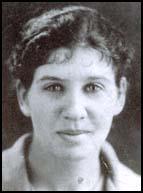Celia Baker

Celia Baker, the daughter of a furrier, was born in Hackney in 1916. Her father was chairman of the local Labour Party.
Baker was educated at Buxton Street School in Whitechapel and despite being a very intelligent student she was forced to leave school at the age of fourteen. Her first job was as an office junior but she later became a book-keeper.
Baker joined Toynbee Hall Rebel Players (later renamed as the Unity Theatre). This included appearing in a play called Madchen In Uniform, which was based in a girls' school in Germany. Baker later recalled that the play was "a great eye opener" about Nazi Germany. As Monica Whately pointed out: "The play revealed so forcibly the degradation of women under Fascist dictatorships and contained a moving call to women to band themselves together as a protection against this world-wide menace."
During the 1930s she became very active in politics and took part in anti-fascist demonstrations. This included attempts to stop Oswald Mosley and the British Union of Fascists from marching through the East End of London.
After the outbreak of the Spanish Civil War she performed in theatre productions to raise funds for Spain. The most popular of these was On Guard for Spain. Two members of the theatre group, Bruce Boswell and Ben Glaser, joined the International Brigades and were killed at Ebro.
Baker was also active in collecting money for Spanish Medical Aid Committee. "I stood on a street-corner in Hackney... and people came and gave tins of soup or whatever. There were all these little organizations that wanted to do something, you know, everyone wanted to do something."
Celia Baker worked closely with the Communist Party of Great Britain until the Nazi-Soviet Pact was signed: "I couldn't take the Soviet-German Pact, I could not accept it. I just thought it was the most terrible thing that had ever happened to me... that the Soviet Union, that we always held up as an ideal, which of course was fantasy, I suppose... I couldn't believe that they had to make a pact with fascism to protect themselves."
Baker later worked as a secretary in a school and later in a medical college. She also remained politically active, especially in the peace movement.
Celia Baker died in 1998.

